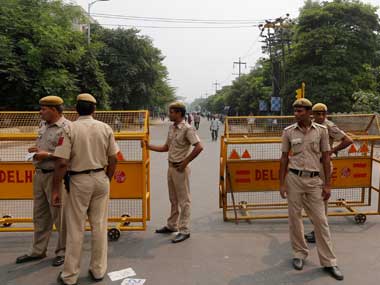In a revelation that poses a serious question about the quality of policing in the national capital, Uber taxi driver Shiv Kumar Yadav who confessed to raping a 27-year-old finance company executive on Friday night near a garbage dump close to Najafgarh drain, had crossed a police picket while taking the woman to the secluded spot but cops did not bother since the woman was asleep on the rear seat. The picket was just a kilometre away from the spot where the crime was committed. It has also come to light now that the ‘character certificate’ to Yadav by the police was forged. In any case, the certificate is not of much use since it is issued on the basis of the criminal record of the person seeking it under the jurisdiction of that particular police station. If he has a criminal case registered in the adjacent police station it goes under the radar, said a source in the police department. Again, the residential proof of the culprit was certified on the basis of documents provided by him. There was no actual verification whether he resided in the address provided by him. The police say in Yadav’s case it was a fake address. It’s impossible for the short-staffed police force to go and check every detail, the source added. [caption id=“attachment_1841219” align=“alignleft” width=“380”]  Representational Image. Reuters[/caption] While the country gets into fits of outrage routinely when such crimes against women take place, the demand for good policing always remains conspicuous by its absence. The question now is, how many Yadavs have obtained fake certificates and clearances from the transport department and are out on the loose, waiting for their chance to commit a crime? Those familiar with the functioning of road transport offices and the police know there would be many. “Police pickets on roads are a mean to extract money from unauthorised carriers plying on roads. It is not at all for safety of people. Senior police officials set a target for each police station and the officials concerned use unfair means to meet the target,” RS Darapuri, ex-inspector general of Uttar Pradesh, told Firstpost. He added, “The response time of the police does not match with the speed of crime. I’ts common everywhere, that cops never reach at the spot when the crime is taking place. We swing into action after the culprits flee and media and people raise hue and cry. This attitude of the police is not going to improve the law and order situation.” The main reason behind sexual violence in public transport and road rage cases is “our faulty and corrupt licensing system. There is an enormous amount of corruption in our transport department. Licences are issued without proper verification and meeting necessary criteria in return for bribe. Therefore, the licensing system needs to be improved,” he said. Former Delhi Police Commissioner, Ved Marwah, linked poor policing to politicians and the goondas that thrive under them. “It is important to have zero tolerance for goondaism. The police in this country work on the instruction of political bosses and muscle power is the greatest hurdle to effective policing here. This is a serious issue which needs to be addressed to check crimes not only in Delhi but everywhere in the country.” “Any case of crime against women should be dealt with utmost seriousness and probe should be conducted in an impartial manner. There should be a time-bound enquiry,” he said adding that that the third important step includes a speedy trial. “Our courts generally take years to finalise cases, which fail to set a precedent and create fear of the rule of law in culprits.” He also feels there should be incentives for investigating officers who crack a case and help the judiciary punish the culprits. Darapuri concurs. “There should be fear of the law among culprits. Our police system should ensure that they have it,” he said. “Despite knowing who the culprits are in most of the cases, the police don’t dare to touch them because of their political connections. If we really want to check crime, the police must act in impartial manner.” He and Marwah share the same opinion on the justice delivery system of the country as well. “Justice delayed is justice denied. Our judiciary must think how to dispose off cases in a time-bound manner,” said Darapuri. He, however, also argues that the overburdened police force is also one of the reasons behind collapsing law and order situation of the country. “The police in many states, especially UP and Delhi, are running short of manpower. The investigating officers are overburdened with cases. In addition, the political bosses of the country give a damn to the dignity of police officers. How can you expect professional policing under such circumstances?” he asked. This correspondent, while reporting the 2012 Delhi gangrape case, had learnt that the bus in which the crime took place was allowed by the police to be on the roads beyond its specified time for a consideration. The bus was finally identified from its registration number recorded in a ‘hafta’ diary, a record of illegally-plying buses for which bribes have been paid for exemption from prosecution. It was identified when the police relayed the description provided by the victims. The entry diary (used by traffic policemen to collect protection money from transporters) gave the exact registration number of the bus, which was later corroborated by a police informer who identified the rapists on the basis of the description provided by the male friend of the girl who was also thrashed mercilessly, sources in the Delhi Police had earlier told this correspondent. Now should we start talking about policing a bit more? It’s certainly more important than politics.
The main reason behind sexual violence in public transport and road rage cases is “our faulty and corrupt licensing system.
Advertisement
End of Article


)

)
)
)
)
)
)
)
)



